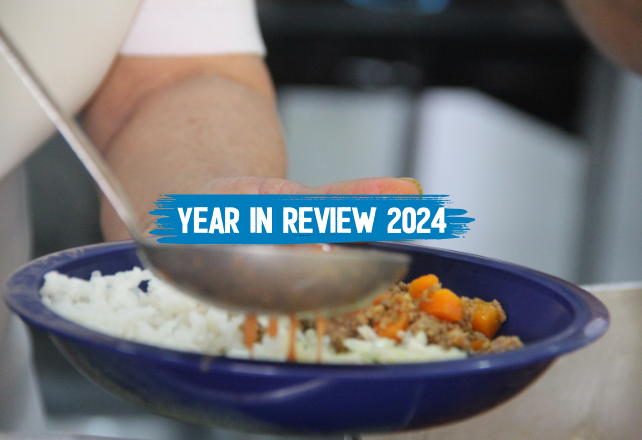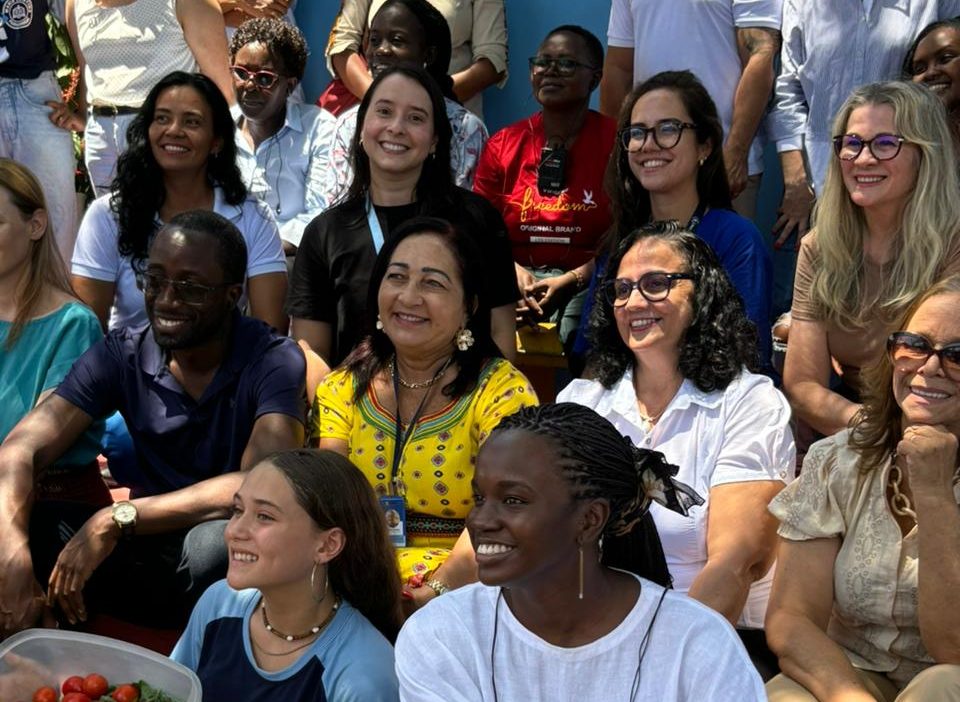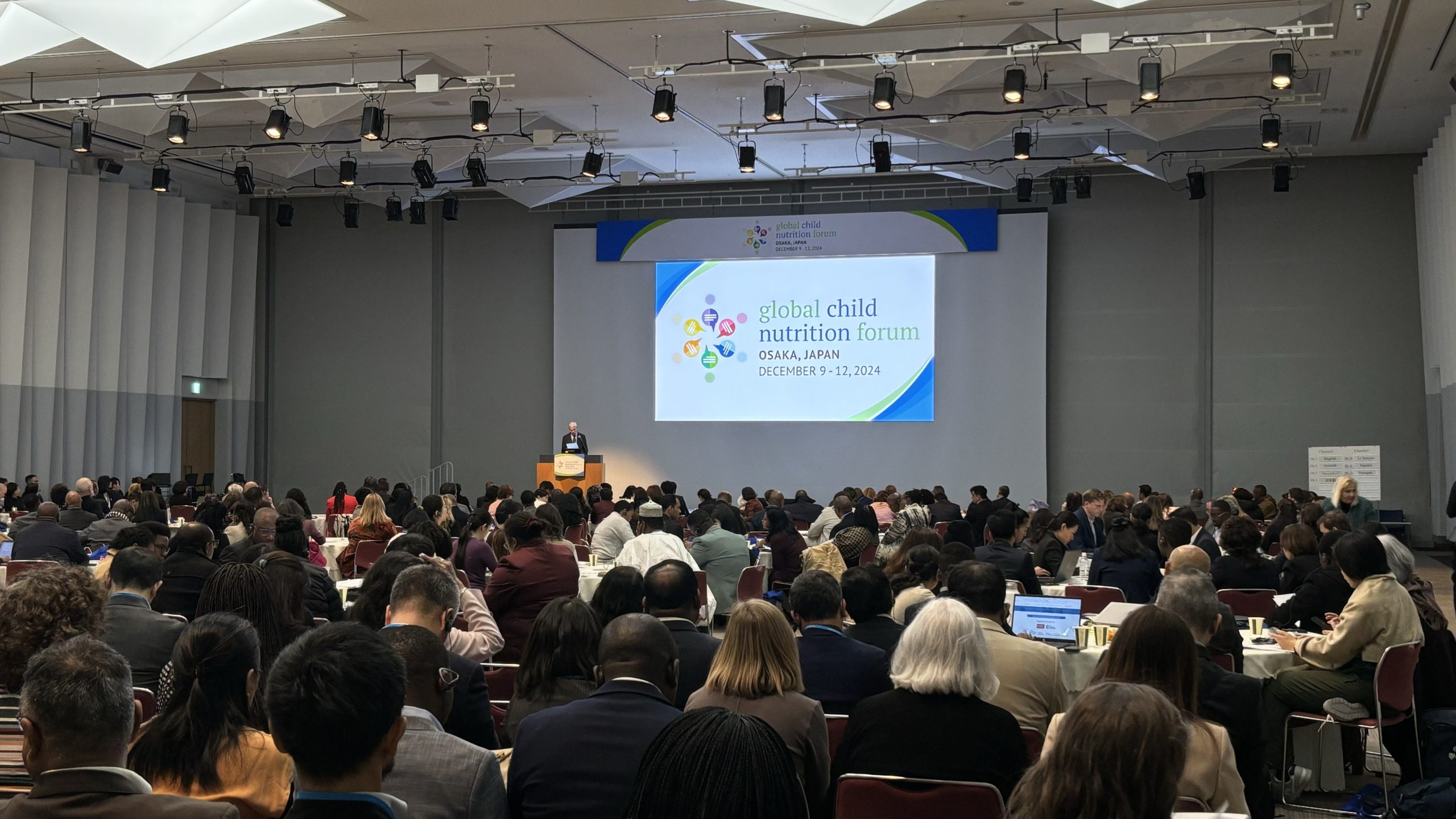 G20
G20
The Year 2024 was marked by the active participation of the World Food Programme (WFP) Centre of Excellence against Hunger Brazil in meetings and working groups leading up to the G20, the main forum for international economic cooperation, which took place on 18 and 19 November in Rio de Janeiro. This was the year when Brazil assumed the rotating presidency of the G20.
One of the highlights of the event was the launch of the Global Alliance Against Hunger and Poverty, announced during a press conference by the Minister of Social Development and Assistance, Family and Fight Against Hunger (MDS), Wellington Dias, and the Director of the WFP Centre of Excellence against Hunger in Brazil, Daniel Balaban, representing all UN agencies in Brazil. The press conference, which gained significant national and international media attention, was held during the G20 Social, an event involving civil society organisations that preceded the G20 meeting.

Within the G20, the WFP participated in the Development and Agriculture Working Groups, as well as the Task Force for the Global Alliance Against Hunger and Poverty. Stanlake Samkange, WFP’s Director of Multilateral Partnerships and Programmes, visited Brazil in March to attend preparatory meetings. In April, Arif Husain, Chief Economist and Director of WFP’s Analysis, Planning, and Performance Division, participated in a meeting of the Agriculture Working Group held in Brasília.
In May, during the 3rd technical meeting of the G20 Task Force for the Global Alliance Against Hunger and Poverty, held in Piauí, a Memorandum of Understanding was signed between the Ministry of Social Development (MDS) and the WFP Centre of Excellence to collaborate on actions aimed at promoting food security and combating hunger in the country.
In July, the Centre of Excellence contributed to discussions at the T20 Brazil Midterm Conference, one of the 13 G20 engagement groups, in Rio de Janeiro. During the event, the Centre’s article was selected as one of the 300 Policy Briefs to be published, with the aim of influencing negotiations and shaping the joint declaration during the G20 Leaders’ Summit.
In June, a WFP delegation, led by its Executive Director, Cindy McCain, travelled to Rio de Janeiro to participate in G20 Development Working Group meetings and launch the 2024 State of Food Security and Nutrition in the World (SOFI) Report during a side event to the Ministerial Meeting of the G20 Task Force for the Global Alliance Against Hunger and Poverty. The report, titled “Financing to End Hunger, Food Insecurity, and All Forms of Malnutrition”, revealed that hunger levels have remained persistently high for three consecutive years amid worsening global crises.
In September, the article “School Feeding: A Unique Strategy to Combat Inequality, Poverty, and Hunger and Achieve the SDGs” was published in T20 Brazil, a G20 group that brings together think tanks and research centres from G20 members, invited countries, and organisations. The article was authored by experts from the Centre of Excellence in partnership with WFP offices in other countries, the Rockefeller Foundation, the School Health and Nutrition UK, and the Global Partnership for Education.
 VIDA DE MERENDEIRA
VIDA DE MERENDEIRA
The second season of the reality show Vida de Merendeiras (Life of a School Cook), aired on the Sabor & Arte channel between May and June 2024. The programme, a partnership between the National Fund for Educational Development (FNDE) and the WFP Centre of Excellence, with the support of the Brazilian Cooperation Agency (ABC), aims to highlight the vital role of school feeding professionals in promoting adequate and healthy nutrition.
This year, the programme featured representatives from Portuguese-speaking African countries, fostering exchanges of experiences and showcasing the guidelines of the National School Feeding Programme (PNAE) within the context of South-South Cooperation.
A total of 15 school cooks from all regions of Brazil participated in the show. The three finalists—Josefa Graciene Ribeiro from Alagoas, Leila Espinoza from Mato Grosso, and Sarah Jane Ribeiro from Minas Gerais—along with the finalist nutritionists Janaína Barbosa, Elianne Arruda, and Marcelia Prado, were awarded a trip to São Tomé and Príncipe. There, they learned more about the country’s school feeding programme and presented their work during the 3rd International Seminar on Best Practices in School Feeding within the Community of Portuguese Language Countries (CPLP).
 STUDY VISITS
STUDY VISITS
Throughout 2024, the Centre organised several study visits, both in person and virtual. Representatives from the Armenian government and WFP staff in the country participated in two virtual visits and one in-person visit during the year. In the virtual visits, videos introduced the Brazilian National School Feeding Programme (PNAE) and covered topics such as legislation, funding, institutional capacity, implementation, community participation, and family farming. During the in-person visit, the delegation had the opportunity to visit schools and cooperatives supplying products for school feeding in Brazil, as well as participate in meetings with representatives from the FNDE.
In April, partners from the Cuban national and local governments and WFP representatives in Cuba participated in a virtual technical meeting with the Centre of Excellence, continuing a series of discussions between the countries that began in September 2023.
Over the year, representatives from the Republic of Congo, São Tomé and Príncipe, Armenia, Cameroon, and Kenya took part in study visits to Brazil. The Kenyan delegation had the chance to explore schools and agricultural cooperatives in Rio Grande do Norte, which shares the same semi-arid biome as Kenya, incorporating sustainable and climate-adapted approaches.
The year also included visits focused on partnerships, with representatives from the Rockefeller Foundation and the British Embassy in Brazil visiting to learn more about the National School Feeding Programme.
 PROJECTS
PROJECTS
The Seeds for Tomorrow Project carried out a series of activities throughout 2024. The project aims to strengthen school feeding and improve smallholder farmers’ access to local markets in the Republic of Congo through South-South Cooperation. It is a partnership between the Brazilian Government, the Government of the Republic of Congo, the WFP Centre of Excellence, and the United Nations Office for South-South Cooperation (UNOSSC). The project is funded by the India, Brazil, and South Africa Facility for Poverty and Hunger Alleviation (IBSA Fund).
Strategies to enhance institutional capacity within ministries, train farmer cooperatives, and support school feeding included technical visits, studies, and thematic workshops for experience-sharing on designing the National School Feeding Programme (PNAE), strengthening family farming, and monitoring and evaluating the PNAE. Additionally, a dedicated project webpage was launched.
The Nurture the Future Project presented its results during a meeting in June with teams from the General Coordination of Food and Nutrition (CGAN), the Department of Health Promotion (DEPROS) of Brazil’s Ministry of Health, and the Brazilian Cooperation Agency (ABC). In its subsequent phase, the project operated in Colombia and Peru, concluding its activities in September. The project aimed to promote adequate and healthy nutrition among school-aged children in these countries through South-South Cooperation.
The Home Grown School Feeding Mission to Kenya, conducted over two weeks in October, introduced the construction of cisterns, provided training on cultivating school gardens, and taught the building of stoves designed to reduce firewood consumption and allow faster food preparation in schools across four regions of the country. The mission aimed to support the establishment of infrastructure and provide community training to ensure the provision of school meals to children using locally grown nutritious food. This mission was implemented by the WFP Centre of Excellence in partnership with the Rockefeller Foundation, the Government of Kenya, the Government of Brazil, the WFP in Kenya, and the Federal University of Campina Grande. I
In October, the WFP Centre of Excellence supported the development of the School Feeding Scale-Up Plan in Malawi. The country aims to expand school feeding coverage to 100% of its schools by 2030. The partnership between Malawi and the Centre of Excellence dates back to 2012, when Malawi sought to establish its own School Health and Nutrition Programme. Currently, school feeding is offered in 48% of Malawian schools, and the country is part of the School Meals Coalition. The Scale-Up Plan was publicly launched in November, receiving widespread attention. In December, the commitment was further reinforced during the participation of government representatives at the Global Child Nutrition Forum (GCNF), the world’s largest event dedicated to child nutrition and school feeding.
The Beyond Cotton Project released a documentary showcasing the results of 18 months of work in Tanzania, benefiting approximately 11,000 cotton farmers in the Mwanza region. Through multidisciplinary activities, the project trained farmers and technicians to diversify their production by intercropping cotton with maize, beans, and sorghum to boost household income and enhance local food security.
The project was carried out within the framework of South-South and Triangular Cooperation. It involved the Tanzanian Government (Ministry of Agriculture, Agricultural Research Institute, and Cotton Council), the Brazilian Government through the Brazilian Cooperation Agency of the Ministry of Foreign Affairs, the Federal University of Campina Grande, and the World Food Programme, represented by the WFP Centre of Excellence against Hunger in Brazil and the WFP in Tanzania. The project was funded by the Brazilian Cotton Institute.

PUBLICATION
The publication “School Feeding Models” was released in February, outlining how financial resources are allocated to school feeding programmes worldwide. This publication was developed by the Centre of Excellence in partnership with the Brazilian Cooperation Agency (ABC) and the National Fund for Educational Development (FNDE).
In March, the publication “Good Practices in School Feeding with Portuguese-speaking Countries” was launched, summarising key points discussed by policymakers and implementers of school feeding policies. It aims to develop resilient, environmentally friendly, gender-sensitive, and nutrition-focused programmes in these countries. This initiative was carried out by the Centre of Excellence in partnership with the ABC and the FNDE.
In May, the Centre of Excellence launched “Policy Brief #6 – Monitoring and Social Control of the PNAE”, which presents tools used to monitor the implementation and accountability of Brazil’s National School Feeding Programme (PNAE).
“Good Practices in School Gardens and School Feeding: Africa, Asia, and Latin America and the Caribbean”, launched in July, showcases successful experiences and innovations from countries such as Armenia, Benin, Brazil (two cases), El Salvador, and Saint Lucia. This publication was jointly produced by the Centre of Excellence, the FNDE, the ABC, and the Brazil-FAO International Cooperation Programme in School Feeding, implemented by the ABC, FNDE, and the United Nations Food and Agriculture Organisation (FAO).
“Addressing the Multiple Burden of Malnutrition”, released in September, presents the outcomes of the Nutrir o Futuro Project in Brazil, Colombia, and Peru, highlighting challenges and perspectives on nutrition and feeding actions in each country. This phase of the project was a partnership between the Centre of Excellence, the ABC, and the Ministries of Health of Brazil, Colombia, and Peru, fostering the exchange of experiences and identifying joint actions to combat malnutrition in the three countries.
EVENTS
The African Union Summit, held on 17–28 February in Addis Ababa, was attended by President Luiz Inácio Lula da Silva, celebrating the historic cooperation between Brazil and the African continent in the areas of school feeding and hunger eradication. The Brazilian delegation also included First Lady Janja da Silva, who participated in various activities as the Ambassador for Brazilian School Feeding. Together, the Centre of Excellence and the African Union supported the incorporation of school feeding into the Continental Education Strategy for Africa (CESA), which has been in effect since 2020.
The Centre of Excellence participated in the 9th edition of the African Day of School Feeding, celebrated on 1 March in Burundi, presenting the panel “School Feeding: A Lever for Social, Economic, and Environmental Transformation.” Created in 2016 after African Union leaders conducted a study visit to Brazil, the African Day of School Feeding symbolises the commitment of African countries to promote school feeding programmes as a crucial strategy to achieve the Sustainable Development Goals.
On 20 June, Brazil marked 15 years of its School Feeding Law. The Director of the Centre of Excellence, Daniel Balaban, attended a virtual event organised by the National Fund for Educational Development (FNDE) with the support of the South-South Cooperation Programme, developed between the Brazilian Cooperation Agency (ABC) and the United Nations Food and Agriculture Organisation (FAO). The event was attended by representatives of the Brazilian government and several countries in Latin America and the Caribbean.
In July, the Centre of Excellence was invited to speak about the role of public policies in combating hunger and the importance of South-South Cooperation at the Fiocruz seminar titled “Global Response to Hunger: National, Regional, and International Responsibilities.”
The United Nations Day for South-South Cooperation was celebrated on 10 September in Brasília at an event hosted by the Brazilian Cooperation Agency (ABC) titled “Global Partners, Local Actions: Strengthening Nutrition and Food Security through Trilateral South-South Cooperation.” The event brought together representatives of the Rome-Based Agencies (RBAs) of the United Nations—the Food and Agriculture Organisation (FAO), the International Fund for Agricultural Development (IFAD), and the World Food Programme (WFP). Also in attendance were the Ambassadors of Kenya, Lemarron Kaanto, and Guatemala, Arturo Duarte, along with representatives from the National Fund for Educational Development (FNDE), the Ministry of Agrarian Development and Family Agriculture (MDA), and the Ministry of Social Development and Fight Against Hunger (MDS).
October marked World Food Day (WFD), celebrated on 16 October by UN agencies WFP, FAO, IFAD, and IICA. This year, the event was held at the SESI Lab museum in Brasília. In 2024, the global movement around WFD focused on the Right to Food for a Better Life and Future.
The Workshop on Food Systems and Climate Change, held in late October in Brasília, brought together experts to discuss climate change and the need to rethink how food is produced and consumed. The event was part of the Convergence Initiative, a UN Food Systems Coordination Hub-led effort to align food systems transformation with climate action. It was organised by Brazil’s Ministry of Foreign Affairs and the UN Food Systems Coordination Hub, with support from the WFP Centre of Excellence in Brazil and FAO.
In November, Brazilian family farmers and cooperatives representing small rural producers participated in the Workshop on Mechanisms for Purchasing Food from Brazilian Family Farming for International Markets, held in Brasília. The workshop gathered around 50 participants from across the country and covered topics such as strategies for accessing international markets via the WFP, food quality control, and training on registering family farming for WFP sales.
In December, São Tomé and Príncipe hosted the 3rd International Seminar on Best Practices in School Feeding in the Community of Portuguese-Speaking Countries (CPLP) and the High-Level Conference on the Presentation of the Global School Meals Coalition by the World Food Programme (WFP). The event aimed to integrate the CPLP into this initiative. The conference featured the education ministers of the nine CPLP member states, representatives from the United Nations, the Brazilian Cooperation Agency (ABC), the National Fund for Educational Development (FNDE), and other partners. In addition to representatives from the Centre of Excellence, the event included the three finalist school cooks from the reality show Vida de Merendeira.

The year was crowned with the Centre of Excellence’s participation in the Global Child Nutrition Forum (GCNF) in Osaka, Japan. The event, themed “School Feeding Programs in the Age of Food Systems Transformation,” brought together representatives from over 80 countries and approximately 450 participants from around the world. A coorganiser of the Forum from 2013 to 2019, the Centre of Excellence hosted the workshop “Creating Demand for Nutritious and Climate-Smart Foods through School Feeding Based on Local Purchases,” which proposed exploring models of school feeding linked to local agriculture in various contexts, focusing on intersectoral collaboration.
The Director of the World Food Programme (WFP) Centre of Excellence against Hunger Brazil, Daniel Balaban, delivered the closing speech at the event. “It’s very interesting to follow the development of countries. Today, all participants have school feeding programmes, which is also the result of the learning and experiences shared at the GCNF over the years. It’s gratifying to see people again and realise that the work being done is already beginning to show results,” he said during his speech.




